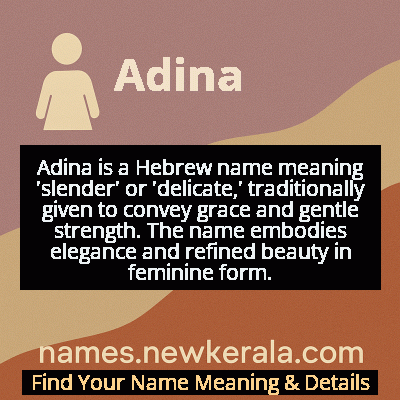Adina Name Meaning & Details
Origin, Popularity, Numerology Analysis & Name Meaning of Adina
Discover the origin, meaning, and cultural significance of the name ADINA. Delve into its historical roots and explore the lasting impact it has had on communities and traditions.
Name
Adina
Gender
Female
Origin
Hebrew
Lucky Number
2
Meaning of the Name - Adina
Adina is a Hebrew name meaning 'slender' or 'delicate,' traditionally given to convey grace and gentle strength. The name embodies elegance and refined beauty in feminine form.
Adina - Complete Numerology Analysis
Your Numerology Number
Based on Pythagorean Numerology System
Ruling Planet
Moon
Positive Nature
Diplomatic, friendly, artistic, empathetic.
Negative Traits
Over-sensitive, moody, indecisive, prone to self-pity.
Lucky Colours
Green, cream, white.
Lucky Days
Monday.
Lucky Stones
Pearl, moonstone.
Harmony Numbers
1, 3, 4.
Best Suited Professions
Diplomats, mediators, caregivers, artists.
What People Like About You
Cooperative spirit, friendliness, artistic talent.
Famous People Named Adina
Adina Porter
Actress
Acclaimed performances in multiple television series including 'True Blood' and 'American Horror Story'
Adina Howard
Singer
Pioneering R&B artist known for her influential hit 'Freak Like Me' in the 1990s
Adina Bar-Shalom
Social Activist
Founded first academic college for Haredi women in Israel, advancing education access
Adina Sommer
Photographer
Internationally exhibited photographer known for distinctive architectural imagery
Name Variations & International Equivalents
Click on blue names to explore their detailed meanings. Gray names with will be available soon.
Cultural & Historical Significance
Extended Personality Analysis
People named Adina typically exhibit a blend of gentle grace and quiet determination that reflects the name's meaning of 'slender.' They often possess natural elegance in their demeanor and approach to life, combining sensitivity with inner strength. Adinas tend to be perceptive and intuitive, with an ability to understand subtle emotional currents in relationships and situations. Their communication style is usually thoughtful and measured, preferring meaningful conversation over superficial chatter. While they may appear reserved initially, they often reveal depth of character and strong convictions upon closer acquaintance. Many Adinas demonstrate artistic appreciation and creative talents, drawn to beauty in various forms from nature to human expression. They typically value harmony and balance in their personal and professional lives, often serving as peacemakers in conflicts. Their combination of empathy and principle makes them both compassionate and reliable, capable of providing steady support while maintaining their own boundaries and values.
Modern Usage & Popularity
In contemporary naming practices, Adina enjoys consistent popularity as a choice that balances tradition with modern appeal. The name maintains strong usage within Jewish communities worldwide, particularly among families seeking biblical names that feel both authentic and contemporary. Outside Jewish contexts, Adina has gained recognition as an elegant, international name that crosses cultural boundaries easily. Its popularity has remained stable rather than trending dramatically, making it a reliable choice for parents seeking something distinctive but not overly unusual. In recent years, the name has seen increased usage in Western countries as parents look for names with historical depth and positive meanings. Social media and global connectivity have contributed to Adina's wider recognition, with the name appearing in various cultural contexts from literature to celebrity children. Current usage patterns show Adina often paired with shorter, modern middle names, creating combinations that feel both timeless and fresh for new generations.
Symbolic & Spiritual Meanings
Symbolically, Adina represents the elegant strength found in flexibility and grace under pressure. The name embodies the concept that true power often resides in gentle persistence rather than overt force, much like water that shapes stone through constant flow. It symbolizes the beauty of proportion and balance, suggesting someone who maintains equilibrium in challenging circumstances and brings harmony to their environment. Metaphorically, Adina evokes images of slender trees that withstand storms through flexibility, representing resilience that doesn't rely on brute strength but rather on adaptability and deep roots. The name also carries connotations of refined beauty that doesn't need to shout for attention, symbolizing quiet confidence and the power of subtle influence. In spiritual terms, Adina suggests the virtue of humility combined with strength - the ability to be both gentle and firm, accommodating yet principled. This symbolic richness makes the name carry depth beyond its literal meaning, representing ideals of balanced character and enduring grace.

